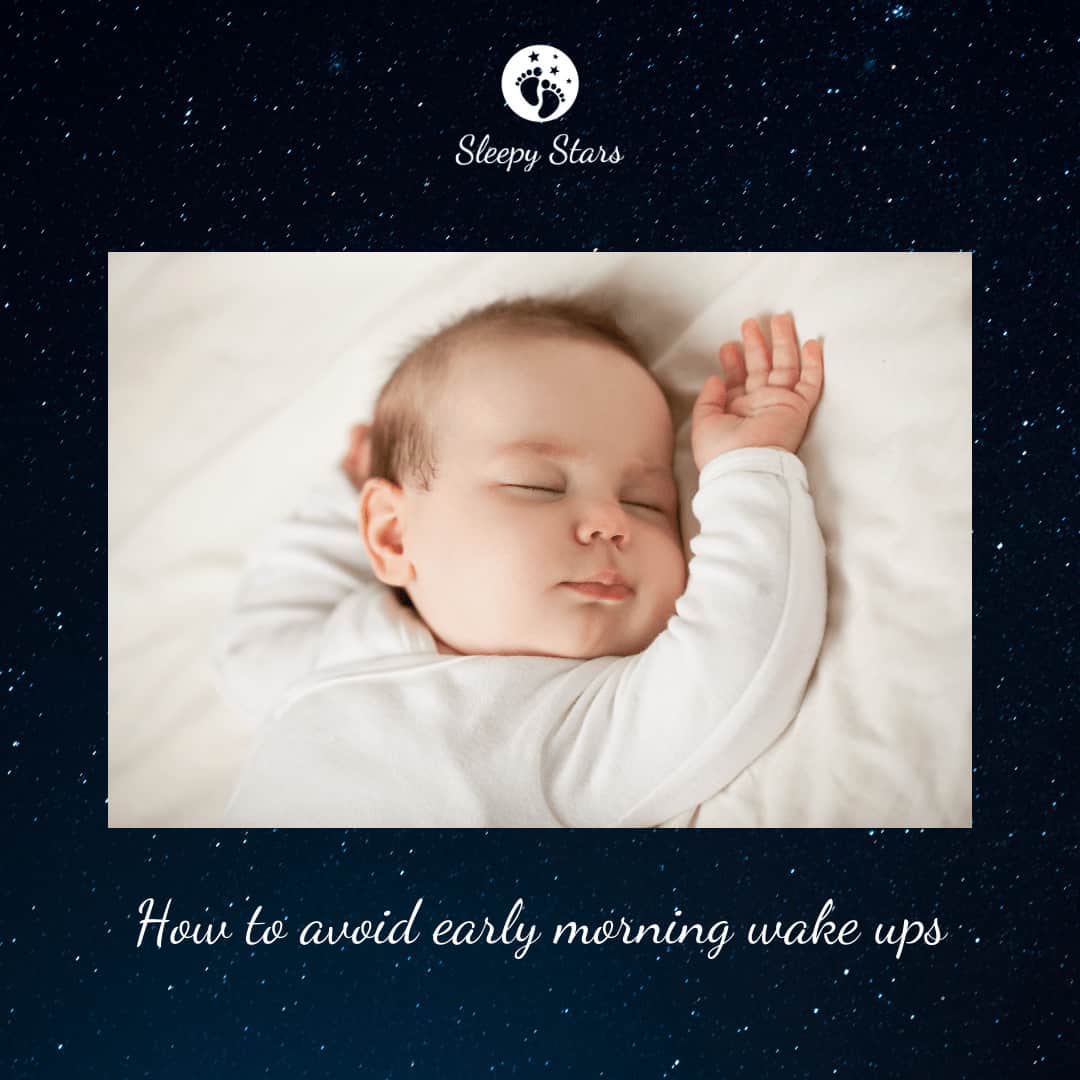

As the brighter early mornings appear you may notice your babies and toddlers waking earlier. If you would like to avoid early morning wake-ups then these tips are for you. There are a number of factors that can contribute to your little one waking up early:

 Daily Schedule
Daily Schedule
I would advise all parents to look at this possible contributing factor first.
Does your child’s current daily schedule mean that they go to bed overtired? A child who goes to bed overtired often wakes up super early the following day. Gone are the days when we once believed – keep them up later and they will sleep later the next morning – this, in fact, is not the case. Ensure that your child’s wake window from their last nap to their bedtime is not too long, if they go to bed overtired, you may observe that they “fight” sleep. They will also have a few very restless first sleep cycles and you may have to attend to them multiple times before midnight until they eventually drop into a deep sleep. Then they are waking early and the cycle begins again.

 Environment
Environment
Is their sleeping environment too bright?
Right now, mid-June in Ireland and the UK, the sun begins to rise at 05:15. Coincidentally a lot of the parents I have worked with recently have reported that their little one is waking around the 05:00 – 05:30 time … mmm interesting!
If you have a very alert and aware little one who you are helping to move towards a longer night of 11 – 12 hours’ sleep, then you may consider revising the window coverings until your child is sleeping longer. Then you can remove the extra coverings. One of the factors that the body clock (your circadian rhythm) is influenced by is the sunrise. When the brain registers that it’s day time it stops producing the sleep hormone melatonin and your little one is ready to start the day.
Many parents will reassure me that the bedroom is dark …
If their child is in a separate room I ask them to run a little test: during daylight I ask them to go to the bedroom that their child sleeps in, and close the curtains, blinds and door and sit in the bedroom for a minimum of ten minutes, letting their eyes adjust to the darkness. After ten minutes, when their eyes have adjusted to the darkness, they will see what their clever little alert child can see in the bright early mornings when they wake.
If a parent shares a room with the baby I simply ask; “Can you see your baby in the mornings when you wake?” If the parent can clearly see the baby then the baby can clearly see the parent; so you can’t blame them for wanting to start their day.
The Sleepy Stars Portable Black-Out Blind is now available https://sleepystars.ie/shop/ Please tell your friends.

Is their sleeping environment too warm or too cold?
One other factor that can become apparent is the temperature of the sleeping environment. In summer months a child’s bedroom is often warm at bedtime, but the temperature drops as the night goes on, especially on nights with no cloud cover. Ensure that your child is dressed accordingly so that they don’t wake up because they are chilly in the early hours. Your child won’t be able to express the reason for their waking, and they may be difficult to resettle. A little one can’t pull a blanket up over them properly until approximately 3 years of age. A sleep bag that suits the temperature of the bedroom will help avoid them waking because they are cold. The safe temperature for a child’s room is between 19-21 degrees celsius.
A company that I recommend to parents is https://www.slumbersac.ie/

 Hunger Habit
Hunger Habit
Our body clocks are not only influenced by the sunrise, they are also very much influenced by the first time that we eat or drink. We naturally wake up approximately 45 minutes to 1 hour before the first time that we eat or drink. Remember those times pre-children, on your day off work, you would wake up early and be annoyed as you wanted to sleep longer? Your circadian rhythm can be very strong and so can your child’s.
What does this mean for your child? Well, if your little one wakes up at 06:00 and you feed them immediately upon waking (often in hopes to use the feed as a snooze button – I don’t blame you), be aware that you are actually encouraging a hunger habit to be formed, and your little one is going to begin to wake earlier and earlier for that feed. If you wish to encourage your child to wake later, try to slowly move out the first feed, and also try to avoid it in the bedroom. Your child has no concept of time, but they do make associations. So by holding off the first feed until you are in the kitchen area will teach your little one not to expect breakfast in bed as soon as they wake.
I hope you found this first blog useful and it would be great if you share it with your friends. If you would like to get baby sleep tips, competitions and free stuff in advance of the blog posts then please do sign up to the newsletter – the link is https://sleepystars.ie/?ff_
Take care
Kelly


